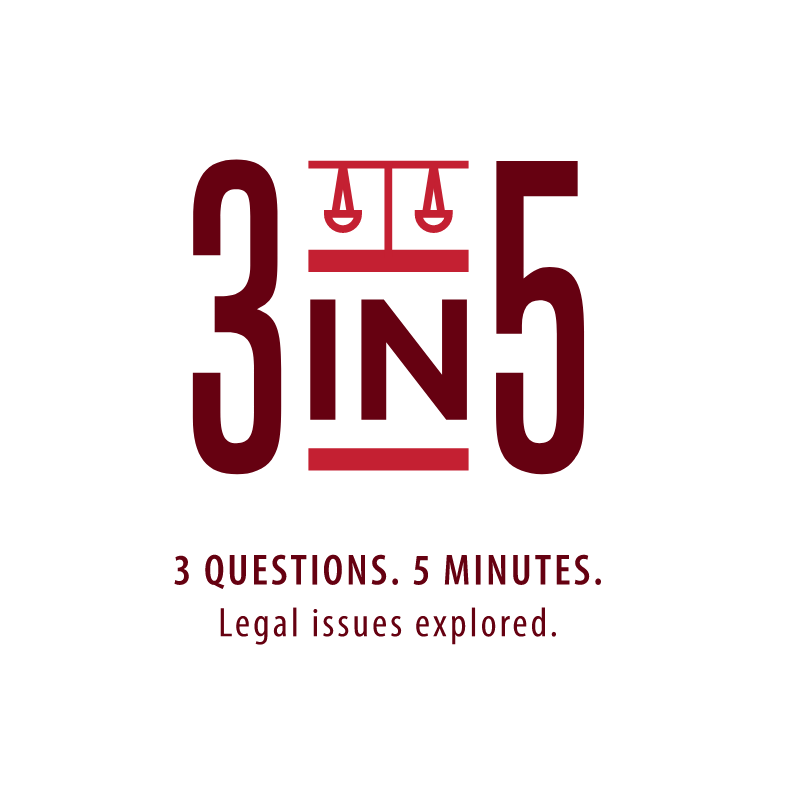
Professor Shima Baradaran Baughman: What role are police serving in society right now? What are they doing? Are they solving crimes? Well, my paper shows they’re actually not.
Diane Maggipinto: This is 3 in 5. I’m Diane Maggipinto, the host of this podcast, three questions in five minutes from the S.J. Quinney College of Law at the University of Utah.
My guest today:
Professor Shima Baradaran Baughman: Shima Baradaran Baughman, I’m associate dean and professor of law at the S.J. Quinney College of Law.
Diane Maggipinto: And here we go. To start, I pulled a quote from your research titled “Crime and the Mythology of Police”: “the existence of the policemen prevents a precise understanding of policing function and certainly the re-examining of policing making meaningful police reform impossible.”
To me that captures, in the few words, what your article is about. So what’s the main takeaway and what might be new in your research?
Professor Shima Baradaran Baughman: There’s a story that I love in “The Black and The Blue”, it’s a book about policing by a black police officer named Matthew Horus. And what he describes is he and his partner are armed, they hear about a domestic dispute, they come rushing into a situation. A man is outside, 300 pound black man, is how he describes him. And then upstairs, they walk up and there’s a, a smaller another man. And, you know, first throws all of their kind of conceptions of domestic violence out the window. But they also are quite threatened because the 300 pound man walks in the room, both he and his partner have their hands on their hips, about to pull out their guns. And luckily he says, you know, by some sheer miracle, he doesn’t pull out his gun because he believes this situation could have escalated into one where people are harmed and they ended up counseling the 300 pound man that they believe is a huge threat. He ends up crying and they kind of work it out.
And I think that story really gets to the heart of what I’m saying in my article. What we’re seeing in America is a lot of police violence, especially against communities of color. But what we’re not really thinking about is, why is that the case? What is underneath all of this and what should the role of police be?
What is the role of police currently, when you look at how police spend their time and what they’re actually fulfilling as a function? That story really shows, you know, police’s function in society is often more like a social worker than somebody that needs to be armed and running in and trained to defend themselves.
That’s part of the problem here.
Diane Maggipinto: I was taken with the numbers in terms of crimes that are solved and how we believe that it’s something very different than what is reality.
Professor Shima Baradaran Baughman: One of the points in discussing, you know, police function is that we believe police are there to solve crimes. And in fact, there’s so many shows on TV about unsolved mysteries and unsolved crimes.
And so our perception is, police solve crime. Well, when you dig into the data, police only solve about 20% of crimes. All major crimes, felonies, murder, rape, larceny, burglary robbery, and of those only about 4% get a conviction, but you can’t blame that fully on police. It’s alarming. I think when you look at the data and think about, you know, how safe you feel, if someone burglarizing my house, it’s only 3% chance a police can catch the burglar and stop them from doing it again.
That’s quite a scary thought.

Diane Maggipinto: Historically, police have had broad support from the public until last year, as you cite in your paper, when that support decreased. Seems on point, why does it matter today?
Professor Shima Baradaran Baughman: What’s relevant here is, when you think about the number of crimes that occur in America and how many people are not helped by police, it’s quite a few. There’s about 20 million victims of serious felony offenses that are not helped by police every year. And my argument wouldn’t be that, you know, let’s find a way to have police arrest all these people. That would not be possible. Thinking about this fully, how do we deal with this? Is there a better way to deal with these crimes?
I’m not positive that police and arrests have to be part of that solution. Right now we’re at the cusp of figuring out how police can be better. Do we reform police? Do we defund police? Do we re-imagine police in some new capacity? For those that maybe have fear in re-imagining police, there should be less fear in that. Police are not actually fulfilling the core function that most people think they are. How can we use police? For instance, have smaller police departments where they’re simply focused on solving crimes, that they’re actually trained for that. And then have the social work issues directed to social workers who are not armed and dealing with these issues without escalating them and, you know, dealing with family problems, neighborhood disputes, traffic officers that are not armed.
The discussion in my paper is meant to have people rethink, why do we call the police to deal with these sort of minor issues? Or, you know, can we rethink how, how we want society to do this? And I think for the first time in a long time, America is really ready to think about what we want police to be doing.
And a lot of people are not wanting them to be serving the same role as they are.
Diane Maggipinto: Your article includes several remedies and ideas for change. How might your ideas be received?
Professor Shima Baradaran Baughman: The biggest obstacle to most of the things I talk about in criminal justice is just people’s perceptions are difficult to change.
I think people have this idea, well if you take police away, if you reduce their role, if you don’t have them armed, then it will be more dangerous, there will be more crime. And all of these fears are really what’s standing in the way of having a proper discussion of police. I think the more we can educate ourselves on what police are actually doing, then it can allow us to understand, well, actually there’s a lot of fear already, right?
People are committing crimes unabated by police as it is. So do we want police to be continuing to serve the role that they are in the way that they’re doing it? Because it doesn’t necessarily take the risk of crime away. And so can we rethink and think about doing this in a better way?
Diane Maggipinto: That’s 3 in 5 from the University of Utah S.J. Quinney College of Law.
